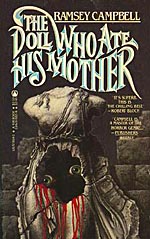
![]() verkisto
verkisto
7/26/2016
![]()
Earlier this year, when I decided to tackle all of Charles Grant's fiction, I remembered that I had never read much of Ramsey Campbell, either. Both authors are well known in horror circles for their own brands of "quiet horror", and when I finished off Grant's works, I decided to start with Campbell's body of work next. I've only read a small number of Campbell's works ("The Words That Count" being the one that had the strongest impact on me), and considering that he's considered a modern master of the genre, I figured it would be a good project to take up after Grant.
This wasn't my first time reading The Doll Who Ate His Mother. When I was in high school, I was such a Stephen King junkie that I pretty much read just his books, along with any books he recommended. That was how I discovered Peter Straub, Shirley Jackson, and the Dell/Abyss line, and when I saw that King had no small amount of praise for The Doll in Danse Macabre, I figured it would be worth my time to read. As I recall, I didn't get around to reading it until I was in college, and what I remember of the book (nothing at all, which is a bit of a surprise, given the opening chapter) suggests that I was underwhelmed.
The thing is, the kind of horror I was reading then is very different from the horror Campbell writes. I didn't appreciate Charles Grant back then, and this book, which wasn't just a huge departure in style for me, but was also full of British terms and slang that were slowing me down, didn't speak much to me, either. Today, I still have trouble reading the book because Campbell uses an awkward narrative style. There were sentences that took me two or three reads to understand just what he was trying to say, and there were some scenes that were downright confusing the way they jumped from person to person without any real segue between them. One particular sentence that stood out to me was in a passage where Campbell was describing the setting on the street (emphasis mine):
Beyond the wire fences at the edge of the pavement, people emerged from small shops with the evening newspaper. Buses honked; ducks flew over them back to the park, honking. Children watched a large green maggot writhing in televisions.
I don't even know what this is supposed to mean. Is it symbolic, or literal? Is this a reference to a children's show in England? Is it supposed to be surrealism? Campbell doesn't elaborate on it; he just moves on with the narrative, as if that one sentence makes perfect sense. I was stumped on it for a minute or two, searching for further context in the surrounding paragraphs.
Overall, the story here isn't very interesting. It starts off well, and shows some potential, but then it just devolves into uninteresting characters doing uninteresting things. I had my suspicions as to who was going to turn out to be the antagonist, and was proven right, but much earlier in the story than I expected. Then the story became about the chase, but it wasn't exciting, nor was it engaging. It just became a matter of waiting to see how it ended.
This was Campbell's first novel, so I don't want to give up on him completely for misstepping, but I do wonder what it was about this novel that made it such a classic. Aside from King making a big deal about it, T.E.D. Klein did, too, especially around the time of its release. It didn't feel atmospheric, and the characters all felt dull and two-dimensional. The reveal happened too early, and the ending came too quickly. Tack on a conclusion that doesn't answer any questions nor add anything to the story, and I'm mystified. Is it just a bad novel, or am I just a bad reader for not getting it?